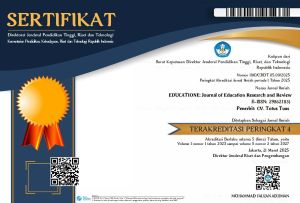ADAPTING THE DIRTY DOZEN IN THE INDONESIAN CONTEXT: PSYCHOMETRIC EVALUATION OF THE DARK TRIAD TRAITS FOR EDUCATIONAL AND PSYCHOLOGICAL RESEARCH
DOI:
https://doi.org/10.59397/edu.v3i2.83Keywords:
adaptation, dark triad, Indonesia, measurement, psychometricsAbstract
Dark triad personality traits—narcissism, psychopathy, and Machiavellianism—are recognized as important constructs in psychological research but have lacked a concise, psychometrically sound assessment tool in Indonesia. This study aimed to adapt and validate the Dirty Dozen (DD) instrument into Bahasa Indonesia to address this gap. Using a sample of 157 adults recruited online, the research employed a rigorous adaptation process, including translation, back-translation, expert judgment, and pilot testing. Psychometric properties were examined through confirmatory factor analysis (CFA) and reliability analysis. Results indicated that the Indonesian DD demonstrated strong reliability and validity for the narcissism and Machiavellianism subscales, while the psychopathy subscale showed lower internal consistency, likely due to cultural and linguistic challenges in item adaptation. The CFA supported the original three-factor structure, with significant overlap between Machiavellianism and psychopathy, and no gender differences found in any domain. In conclusion, the Indonesian DD is a practical and efficient tool for measuring dark triad traits in local populations, though refinement of psychopathy items and response scale categories is recommended for future research.
Downloads
Published
How to Cite
Issue
Section
Citation Check
License
Copyright (c) 2025 EDUCATIONE

This work is licensed under a Creative Commons Attribution 4.0 International License.



















